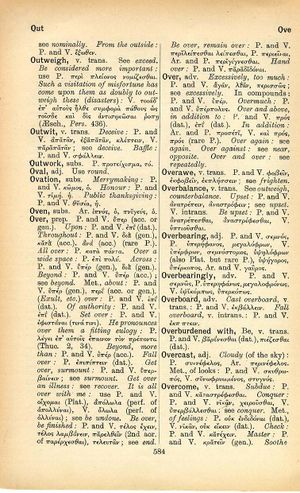over: Difference between revisions
τὸ κακὸν δοκεῖν ποτ' ἐσθλὸν τῷδ' ἔμμεν' ὅτῳ φρένας θεὸς ἄγει πρὸς ἄταν → evil appears as good to him whose mind the god is leading to destruction (Sophocles, Antigone 622f.)
(Woodhouse 4) |
(CSV4) |
||
| Line 1: | Line 1: | ||
{{ | {{Woodhouse1 | ||
| | |Text=[[File:woodhouse_584.jpg|thumb|link={{filepath:woodhouse_584.jpg}}]]'''prep.''' | ||
P. and V. ὑπερ (acc. or gen.). | |||
<b class="b2">Upon</b>: P. and V. ἐπί (dat.). | |||
<b class="b2">Throughout</b>: P. and V. διὰ (gen.), κατὰ (acc.), ἀνά (acc.) (rare P.). | |||
<b class="b2">All over</b>: P. κατὰ πάντα. | |||
<b class="b2">Over a wide space</b>: P. ἐπὶ πολύ. | |||
<b class="b2">Across</b>: P. and V. [[ὑπέρ]] (gen.), διὰ (gen.). | |||
<b class="b2">Beyond</b>: P. and V. [[ὑπέρ]] (acc.); see [[beyond]]. | |||
Met., <b class="b2">about</b>: P. and V. [[ὑπέρ]] (gen.). [[περί]] (acc. or gen.). | |||
(<b class="b2">Exult, etc.</b>) <b class="b2">over</b>: P. and V. ἐπί (dat.). | |||
<b class="b2">Of authority</b>: P. and V. ἐπί (dat.). | |||
<b class="b2">Set over</b>: P. and V. ἐφιστάναι (τινά τινι). | |||
<b class="b2">He pronounces over them a fitting eulogy</b>: P. λέγει ἐπʼ αὐτοῖς ἔπαινον τὸν πρέποντα (Thuc. 2, 34). | |||
<b class="b2">Beyond, more than</b>: P. and V. [[ὑπέρ]] (acc.). | |||
<b class="b2">Fall over</b>: P. ἐπιπίπτειν (dat.). | |||
<b class="b2">Get over, surmount</b>: P. and V. ὑπερβαίνειν; see [[surmount]]. | |||
<b class="b2">Get over an illness</b>: see [[recover]]. | |||
<b class="b2">It is all over with me</b>: use P. and V. [[οἴχομαι]] (Plat.), ἀπόλωλα (perf. of [[ἀπόλλυμι|ἀπολλύναι]]), V. [[ὄλωλα]] (perf. of ὀλλύναι); see [[be undone]]. | |||
<b class="b2">Be over, be finished</b>: P. and V. [[τέλος]] ἔχειν, [[τέλος]] [[λαμβάνω|λαμβάνειν]], παρελθεῖν (2nd aor. of παρέρχεσθαι), τελευτᾶν; see [[end]]. | |||
<b class="b2">Be over, remain over</b>: P. and V. περιλείπεσθαι, λείπεσθαι, P. περιεῖναι, Ar. and P. περιγίγνεσθαι. | |||
<b class="b2">Hand over</b>: P. and V. παραδιδόναι. | |||
'''adv.''' | |||
<b class="b2">Excessively, too much</b>: P. and V. [[ἄγαν]], [[λίαν]], περισσῶς; see [[excessively]]. | |||
<b class="b2">In compounds</b>: P. and V. [[ὑπέρ]]. | |||
<b class="b2">Overmuch</b>: P. and V. [[ὑπέρπολυς]]. | |||
<b class="b2">Over and above, in addition to</b>: P. and V. [[πρός]] (dat.), ἐπί (dat.). | |||
<b class="b2">In addition</b>: Ar. and V. [[προσέτι]], V. καὶ [[πρός]], [[πρός]] (rare P.). | |||
<b class="b2">Over again</b>: see [[again]]. | |||
<b class="b2">Over against</b>: see [[near]], [[opposite]]. | |||
<b class="b2">Over and over</b>: see [[repeatedly]]. | |||
}} | }} | ||
Revision as of 09:47, 21 July 2017
English > Greek (Woodhouse)
prep.
P. and V. ὑπερ (acc. or gen.). Upon: P. and V. ἐπί (dat.). Throughout: P. and V. διὰ (gen.), κατὰ (acc.), ἀνά (acc.) (rare P.). All over: P. κατὰ πάντα. Over a wide space: P. ἐπὶ πολύ. Across: P. and V. ὑπέρ (gen.), διὰ (gen.). Beyond: P. and V. ὑπέρ (acc.); see beyond. Met., about: P. and V. ὑπέρ (gen.). περί (acc. or gen.). (Exult, etc.) over: P. and V. ἐπί (dat.). Of authority: P. and V. ἐπί (dat.). Set over: P. and V. ἐφιστάναι (τινά τινι). He pronounces over them a fitting eulogy: P. λέγει ἐπʼ αὐτοῖς ἔπαινον τὸν πρέποντα (Thuc. 2, 34). Beyond, more than: P. and V. ὑπέρ (acc.). Fall over: P. ἐπιπίπτειν (dat.). Get over, surmount: P. and V. ὑπερβαίνειν; see surmount. Get over an illness: see recover. It is all over with me: use P. and V. οἴχομαι (Plat.), ἀπόλωλα (perf. of ἀπολλύναι), V. ὄλωλα (perf. of ὀλλύναι); see be undone. Be over, be finished: P. and V. τέλος ἔχειν, τέλος λαμβάνειν, παρελθεῖν (2nd aor. of παρέρχεσθαι), τελευτᾶν; see end. Be over, remain over: P. and V. περιλείπεσθαι, λείπεσθαι, P. περιεῖναι, Ar. and P. περιγίγνεσθαι. Hand over: P. and V. παραδιδόναι. adv. Excessively, too much: P. and V. ἄγαν, λίαν, περισσῶς; see excessively. In compounds: P. and V. ὑπέρ. Overmuch: P. and V. ὑπέρπολυς. Over and above, in addition to: P. and V. πρός (dat.), ἐπί (dat.). In addition: Ar. and V. προσέτι, V. καὶ πρός, πρός (rare P.). Over again: see again. Over against: see near, opposite. Over and over: see repeatedly.

